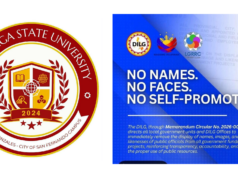The word “latah” is not found in Webster’s collegiate dictionary, but it’s in a dictionary of not-so-usual words published by the New York Times. It refers to the propensity of a certain Asian race to ape the ways of Westerners to a level that borders on the ludicrous.
The etymology is not given, but there’s a mere hairline between that and the Tagalog word “lata” or tin can which conveys cheapness. Could that Asian race, therefore, refer to Filipinos?
Probably. Among Asians, us Pinoys are noted to either slang our tongues or push ourselves to speak English in the periphery of comedy even if we’d do better using Tagalog between us.
Pinoys in the US are among the first Asians to Americanize their homes, slang English and all, and even the Philippine born, grown and wizened, upon reaching American soil, push themselves to a tongue obviously not theirs and sounding, indeed, ludicrous.
It’s not so with other Asians, such as the Japanese who go on revering native language, customs and traditions for bequeathal to children born in America, or the Chinese who are not embarrassed speaking Fookien or Mandarin in lands foreign, building there solid communities where you find Chinese who would speak nothing but Chinese to the day they die (I won’t go for this, but I’m trying to drive a point here).
The advantage of “latah” afflicting us Pinoys is that employment comes easy now since call centers have crept our shores. We’re not short of folk who speak slang, the kind you hear at fast food chains asking “Whaddyu have, sweetie?” Despite our country’s being favorite base, however, call centers still complain of shortage, because most Pinoy tongues, alas, still have to curl to American slang.
You’d know what I mean by attending a court hearing anywhere. The judge, by habit it would seem, rattles off the law in ornate English, and the lawyer lumbers with his own English outside known categorization. You are sure, however, that justice would be faster served if all in court spoke Tagalog (unless a foreigner is involved, of course), as I suspect that all of them are avid followers of Dyesebel and Pangako Sa ‘Yo, anyway.
The consolation is that, at least in most of our courts, what’s spoken seems properly ironed out, to some extent, by what’s written. Judges and lawyers are better read than heard although it would help if they heeded Chief Justice Puno’s appeal for them to abandon archaic legalese and write simply, officially.
But going back to where we started… “latah”, it seems, is a shorter albeit even cheaper version of that familiar term “colonial mentality”. It goes beyond aping how Caucasians, particularly idolized Americans, conduct themselves orally and visually. It’s also a reflection of lack of pride in our being Filipinos, so we tend to doubt our capability to go on level with or even higher than “better looking” Caucasians (skin whiteners have been making good business in brown RP).
Oh yes, it’s such a pity that we’d rather rely on foreign inventions instead of on our own. Note, for example, the laments of the Council on Philippine Affairs (COPA) on the propensity of the government to drive away Filipino inventors:
-Ben Santos, inventor of zero oil waste recycling, was almost held for economic sabotage by the Economic Intelligence and Investigation Bureau;
-Johnson Fong, who re-engineered carbonless paper, got his product accepted locally only after he had it exported, re-labeled, and imported;
-Roberto del Rosario, inventor of the sing-along system, never got support from the government in his bid to assert his invention against the later karaoke system clone.
Now, suspend your judgment on this piece being in English. Since I landed in school decades and decades ago, it’s the only language I was trained to use on paper.




